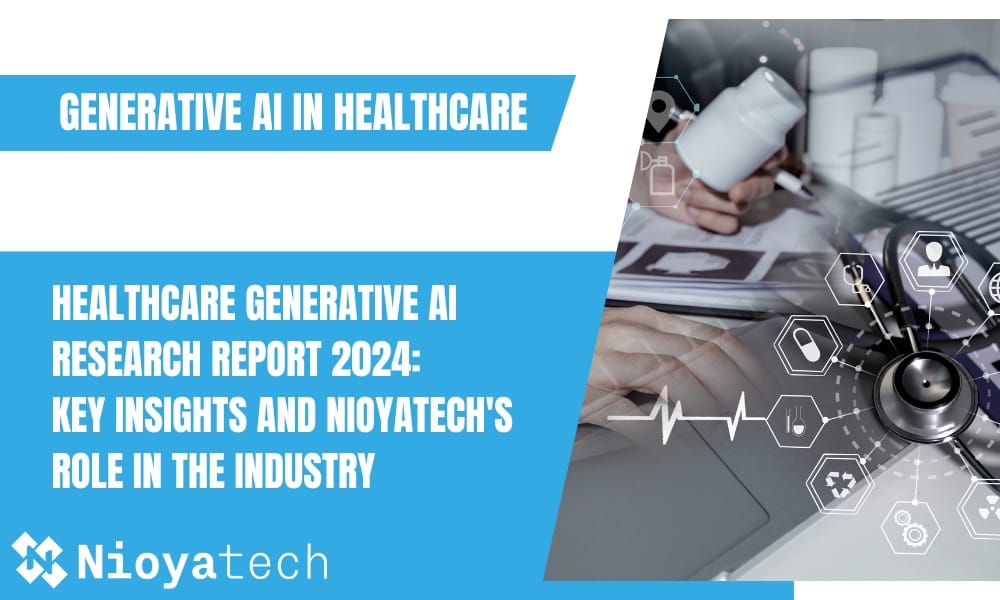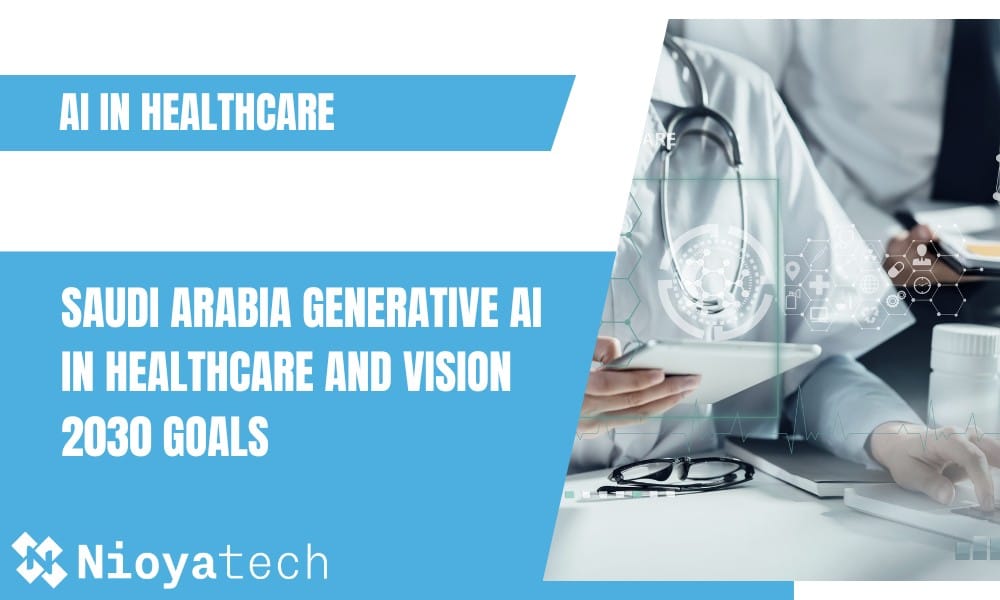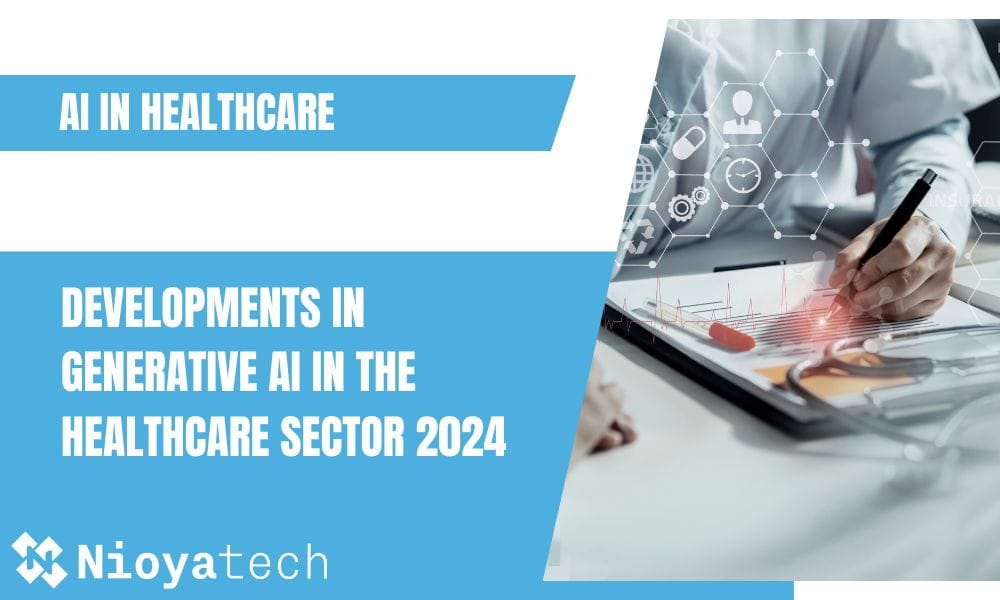Saudi Arabia Generative AI in Healthcare and Vision 2030 Goals
Saudi Arabia is rapidly becoming a leader in healthcare innovation, with generative AI serving as a cornerstone of this transformation. From enhancing diagnostics to streamlining operations, this technology is reshaping the sector while supporting Saudi Arabia’s Vision 2030—a blueprint for economic diversification and technological advancement.
By 2030, the generative artificial intelligence market in healthcare in Saudi Arabia is expected to have a projected value of 282.1 million US dollars according to Horizon Grand View latest research. Between 2024 and 2030, the Saudi Arabian market for generative artificial intelligence in healthcare is projected to achieve a compound annual growth rate of 34.5%.
In this blog post, we’ll explore the applications of generative AI in Saudi Arabia’s healthcare industry, its alignment with Vision 2030 goals, and the key players driving these advancements.
What is Generative AI?
Generative AI is a more advanced form of AI that has the ability to automatically generate new text, images, or even entire datasets. It does this by learning from the vast amounts of data that are accessible to it in order to generate outputs that are contextually relevant and extremely helpful for problem-solving. Significant progress has been made in the areas of diagnosis, treatment, and research because of applications in the healthcare industry.
Key Applications of Generative AI in Saudi Arabia’s Healthcare Sector
1. Medical Diagnosis and Imaging
Complex medical images, such as X-rays, MRIs, and CT scans, are analyzed by generative AI systems, which are able to identify illnesses such as cancer, heart disease, and neurological disorders with an accuracy that is completely unmatched. Therefore, early diagnosis, which is made possible by the AI tool, immediately improves patient outcomes and is in line with Saudi Arabia’s commitment on providing healthcare services of the highest possible professional standard.
2. Personalized Patient Care
AI models make use of patient data in order to develop individualized treatment strategies. Through the analysis of individual medical histories and real-time health data, it assists in the delivery of individualized care, which is a priority under the proposed healthcare reforms in the Kingdom.
3. Research and Development of Pharmaceuticals
The pharmaceutical industry in Saudi Arabia is embracing generative AI as a means of accelerating the discovery of new drugs. These kinds of platforms make it possible for researchers to forecast how drugs will interact with human cells, which in turn significantly cuts down on the expenses and periods of time associated with the development process.
4. Health Records Management
The maintenance of electronic health records is made easier by generative AI through the process of de-identifying sensitive patient data. This procedure ensures compliance with applicable privacy legislation.
5. Telemedicine and Virtual Assistants
Managing patient inquiries, giving appointment slots, and doing preliminary diagnosis of symptoms are all tasks that are being performed by chatbots and virtual assistants powered by artificial intelligence to enhance telemedicine services. Because of this innovation, access to medical treatment is increased, particularly in regions that are difficult to access.
Generative AI and Vision 2030
Saudi Arabia’s Vision 2030 emphasizes the modernization of public services, including healthcare, through technology. This makes the country a regional competitor in the field. The Kingdom wants to improve healthcare standards by using digital health technologies like AI, data mining, genetics, and bioinformatics. They also want to stress how important it is to keep data safe and focus on the patient.
More study needs to be done to find out what the benefits of these new technologies might be and where the growth opportunities are in digital health in the future. Generative AI contributes to these goals by:
Expanding Accessibility
Advancing Medical Research
Driving Economic Growth
Expanding Accessibility
Innovative solutions that fill service gaps made possible by generative AI increase healthcare accessibility in Saudi Arabia. Generative models-powered AI-driven telemedicine solutions can replicate real-time doctor-patient interactions, translate for multilingual consultations, and deliver detailed medical advice to rural and underprivileged locations. Automating medical documentation and creating patient-specific care plans with these solutions reduces administrative burdens and lets doctors focus on patient care.
Advancing Medical Research
Saudi Arabia invests in medical R&D and workforce development to suit changing healthcare needs. Joint clinical studies like MIT-developed early breast cancer detection tools demonstrate National Biotechnology Strategy and regulatory framework support for innovation. Saudization replaces expatriates with Saudis, while workforce goals include hiring 175,000 healthcare professionals by 2030.
Driving Economic Growth
Vision 2030 involves overhauling Saudi Arabia’s 26th-ranked healthcare system. With approximately USD 66.6 billion spent on health and social development in 2023 and SAR 214 billion (USD 57.04 billion) earmarked for 2024, the Kingdom is promoting telemedicine, AI adoption, and digital health breakthroughs through the Saudi Data & AI Authority. Hospitals, health service expansions, and automated ambulance communication are key.
Nioyatech: A Key Player in Generative AI for Healthcare
Many major organizations are leading the way in using generative AI in healthcare, and each one has new ways to improve both patient care and business operations as a whole. Microsoft is the best place to go if you need models, software development kits (SDKs), APIs, speech recognition, or language understanding. OpenAI, on the other hand, improves big data and machine learning solutions for clinical healthcare, while IBM Watson Health uses AI to analyze data to help patients get better care.
As highlighted in market insights by Grand View Research, Nioyatech is among the pioneering firms leveraging generative AI in healthcare. The company’s innovative solutions span drug development, data processing, and personalized patient care, contributing significantly to the transformation of Saudi Arabia’s healthcare landscape.
By leveraging cutting-edge technologies, operating efficiently, and adhering to regulations, Nioyatech positions itself as a key partner for businesses in Saudi Arabia looking to align with and contribute to the Vision 2030 goals.
Conclusion
Generative AI is not just a technological advancement; it is a strategic enabler for Saudi Arabia’s healthcare sector. By improving diagnostics, personalizing treatments, and accelerating medical research, it aligns with the Kingdom’s vision for a tech-driven future. Companies like Nioyatech are integral to this transformation, showcasing the power of innovation in delivering better health outcomes and economic growth.






